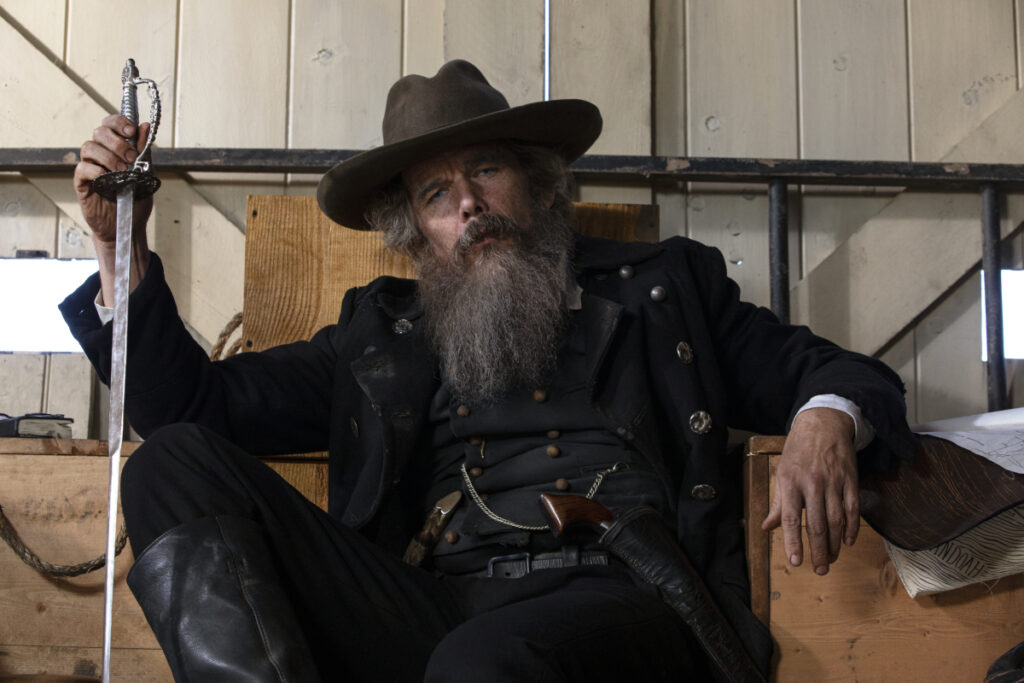Showtime’s “The Good Lord Bird” can be hard to wrap your arms around. That’s by design. It’s right there in the tongue-in-cheek words that open every episode: “All of This is True. Most of It Happened.” It pushes back against the typically dry or exploitative tones of Civil War-era filmmaking to present something that feels satirical in unpredictable ways. It is a Western at its core, filled with incredible settings and design, but it is vibrantly alive in ways that television versions of this genre haven’t been in years. Anchored by a truly remarkable performance from Ethan Hawke, “The Good Lord Bird” is smart, entertaining television that doesn’t highlight or underline its timeliness or messages as much as it allows the viewers to do half the work. As long as you don’t come to it for a direct history lesson, it is as entertaining as almost any new show of 2020, a razor-sharp seven-episode stretch that flies by with such determination that I’m tempted to watch it again.

Newcomer Joshua Caleb Johnson narrates the story of Onion, a slave boy who finds himself a part of the abolitionist army in Bleeding Kansas, a time when the state became a battleground over the issue of slavery. John Brown (Hawke) believed that slavery was a literal affront to God. A man who preached the word of the Lord with nearly every breath, John Brown saw slavery as a sin, and let’s just say Brown was willing to lead the “Gunfighters of the Gospel” to stop it. Hawke plays Brown as a fire-and-brimstone preacher, with his wide eyes and bushy beard, and the passion in his performance is palpable. It’s a riveting piece of work, capturing a man for whom impassioned speeches about the very fate of mankind would just come tumbling out of him as if there was no way he could stop them. Hawke is one of the most impressive actors of his generation, a man who can look as comfortable in a modern rom-com as he does in the middle of the fight against slavery. He holds every frame he’s in of “The Good Lord Bird,” and his passion for his craft clearly inspired everyone else, on both sides of the camera.
Brown’s instinctual style is contrasted nicely with a vision of Frederick Douglass (Daveed Diggs) as a man very aware of his image and every carefully chosen word. Creators Mark Richard and Hawke envision Douglass not as a vain person—although a bit about how much the camera loves him edges into that territory—but as someone who had to watch everything that he said and did. By the time he appears in this show, he’s in a position of power in his speeches about the tyranny of slavery, and there’s a fascinating contrast to the regulated control of Douglass against Brown’s righteous fury of unchecked indignation. Douglass believes in using his position to change the world; Brown believes in letting the world burn.
However, this is not a white savior narrative. If anything, Onion’s story pokes holes in that very concept. The young man ends up being confused for a girl, and Brown and his company consider Onion a young lady for the bulk of the show, even dressing him as such. It’s a funny subplot that’s not overdone but really just a part of one of the main thematic thrusts of the show in that Onion is freed from slavery but then denied ownership over his actual existence. He’s still told what to do, what to wear, and where to be. What constitutes actual freedom and how easily liberators can become a different kind of oppressor is weaved through all seven episodes, but this is a show refreshingly light on forced timeliness, allowing viewers instead of characters to draw those connections. You will probably draw them.

It’s also an undeniably impressive show merely in terms of scope and execution. Over seven episodes, Onion and John travel the country, and the production has an incredible eye, finding detail in period elements while also never making them look overly polished. Everything feels carefully considered but it’s also one of the sweatiest, dirtiest shows in a long time. And each episode is tightly directed, most of them coming in at around 45 minutes, with the season never succumbing to the midseason sag that has afflicted so much Prestige TV in the Netflix era.
One of the reasons for that last element is the extended ensemble, which allows for familiar faces to come forward for an episode or two and then fall back into the mix. The show belongs to Hawke and Johnson, but there are subtle small turns throughout all seven episodes, including fun performances from Steve Zahn, Maya Hawke, Beau Knapp, Natasha Marc, Wyatt Russell, Hubert Point-Du Jour, Orlando Jones, and more. (If there’s a flaw in narrative balance, it would be that the female characters are largely underwritten devices but Marc and Maya Hawke do make an impact with their single episodes.) There’s a blend of satire and historical fiction here that clearly invigorated the entire cast, as did being near the force of nature that is Hawke’s performance.
Where do speech and belief intersect with action? “The Good Lord Bird” is about a tumultuous time in American history, and it captures people rolling through it as they try to hold onto what they think is important in the grand scheme of things. John Brown may be “nuttier than a squirrel turd,” but Hawke captures the truth of a man who believed talk was no longer the answer. There are periods in history when the situation calls for people to get a little nutty.
Whole series screened for review.












